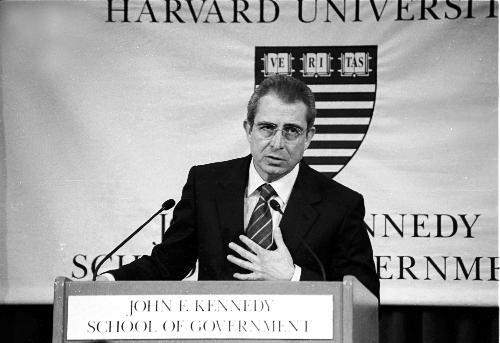
News
Summers Will Not Finish Semester of Teaching as Harvard Investigates Epstein Ties

News
Harvard College Students Report Favoring Divestment from Israel in HUA Survey

News
‘He Should Resign’: Harvard Undergrads Take Hard Line Against Summers Over Epstein Scandal

News
Harvard To Launch New Investigation Into Epstein’s Ties to Summers, Other University Affiliates

News
Harvard Students To Vote on Divestment From Israel in Inaugural HUA Election Survey
Former Mexican President Speaks at IOP

Wealthy industrialized nations have an obligation to break down trade barriers and open world markets to developing nations, said former Mexican President Ernesto Zedillo in a speech at the Kennedy School of Government’s ARCO Forum last night.
“Rich countries indeed have a responsibility to alleviate poverty in the rest of the world,” he told a crowd of approximately 500.
University President Lawrence H. Summers, who first met Zedillo during his days as Undersecretary of the Treasury, praised Zedillo’s sound economic philosophies when introducing him.
He recalled his initial encounter with the former Mexican president in 1995 during the country’s economic crisis, brought on by the collapse of the peso.
Amidst that hectic atmosphere, Summers said, Zedillo remained calm and delivered an economics lecture of true distinction, explaining why the basic economic laws of supply and demand did not apply to Mexico’s interest rate woes.
“[He was] perhaps the only president in the world who could give a presentation on credit-rationing,” Summers said.
Addressing issues raised by the Sept. 11 terrorist attacks in last night’s speech, Zedillo said the urgency of alleviating world poverty was even more apparent today.
“Cooperative, managed, sustainable interdependence is what will, more than anything else, achieve security in the world,” he said. “The fanatics [that carry out terrorist attacks]...are less likely to exist in a less polarized...world.”
Zedillo cited statistics projected by the World Bank that indicate that in the year 2015, 2.2 billion people will be living on less than two dollars per day.
But he also said growth policy alone could not solve problems of social inequality and exclusion of certain groups from the market economy.
“By itself, mere growth will not suffice,” he said. “I am a believer in state intervention on social policies.”
But several audience members felt Zedillo’s speech—entitled “Leading Through Multilateralism: Security, Social Justice, and Economic Inclusion”—failed to live up to its title’s promise.
During the question and answer period, Zedillo was criticized for his handling of economic and political inclusion issues during his administration, particularly his response to the political situation of indigenous peoples in southern Mexico.
While responding to questions on the topic, Zedillo was interrupted by an anonymous crowd member who yelled, “The truth would be nice.”
Others who disagreed did so in a milder tone.
Tzi Tzi Delgado, a native Mexican who currently resides in Somerville, Mass., questioned Zedillo’s recommendations for economic integration in a politically divided nation. Delgado also distributed fliers advertising a presentation of videos by the indigenous Chiapa people of southern Mexico after the event.
“He knows what he’s talking about,” she said, “but I really don’t think [his proposal] is good for some people.”
Want to keep up with breaking news? Subscribe to our email newsletter.
